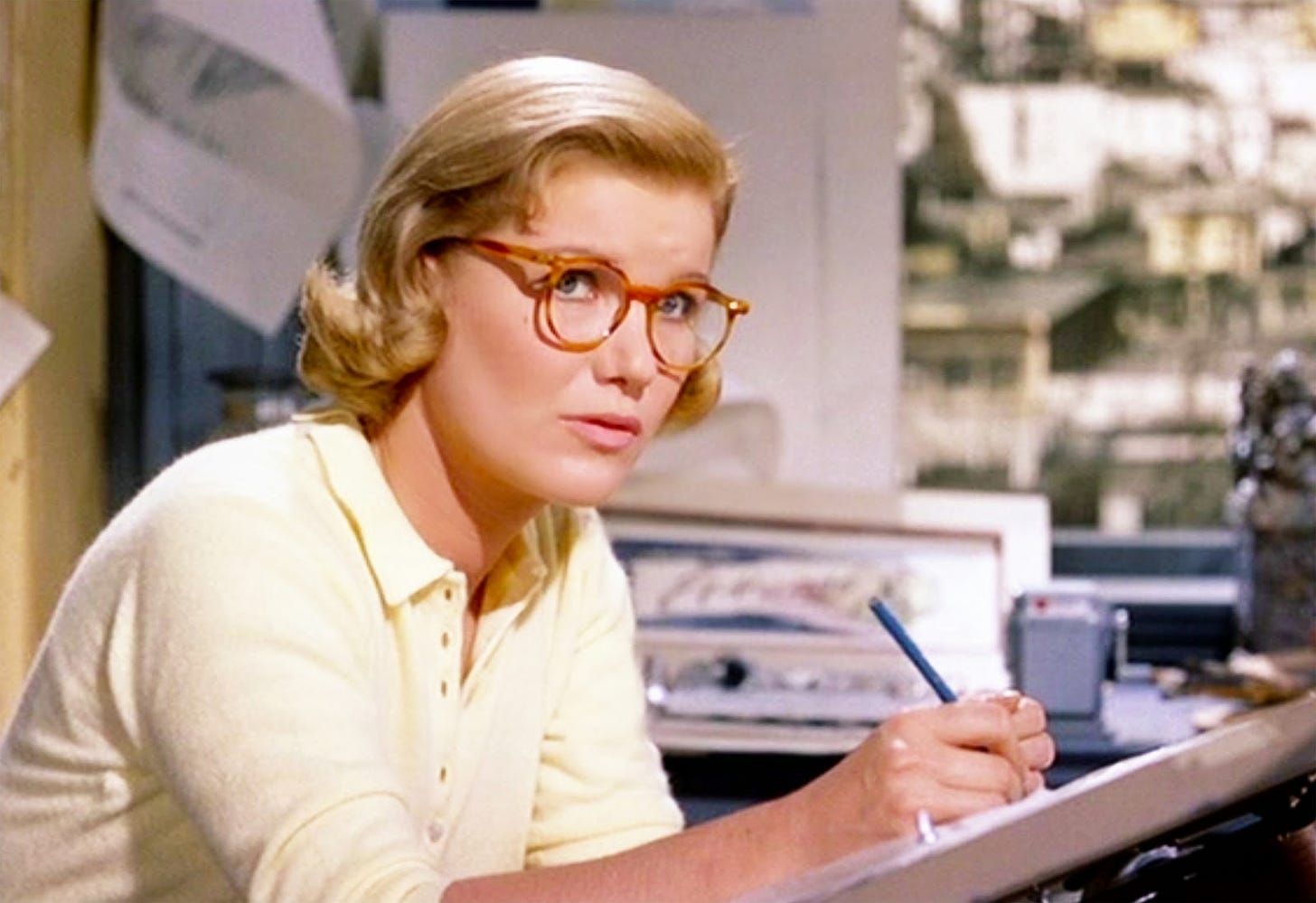Marjorie Also Known as Midge
In ‘Vertigo,’ Barbara Bel Geddes plays a lovesick sidekick. What could have been a thankless part becomes as rich and moving as any role in the film.
Search YouTube or pull out your Blu-ray or DVD edition of Vertigo and you’ll find that the film has an alternate ending, one reluctantly shot by Alfred Hitchcock to satisfy the needs of either overseas censors or the American Production Code. Had Hitchcock not gotten his way, it would have appeared immediately after the ending we know, the one that leaves John “Scottie” Ferguson (James Stewart) looking down at the body of Judy Barton (Kim Novak), the woman he first knew as Madeleine Elster, his arms slightly extended from his torso, his body tilted forward just a little, as if he, with the smallest shift, too might fall.
In this ending that never was, Scottie returns to the apartment of Marjorie “Midge” Wood (Barbara Bel Geddes), an old college friend to whom he was once engaged who’s offered solace to him throughout the film, even at his lowest moment as a catatonic left speechless by a nervous breakdown. Scottie arrives as Midge listens to a radio report about the manhunt for Gavin Elster (Tom Helmore), Scottie’s old friend who hired him to follow Judy posing as Madeleine as part of an elaborate scheme to fake the real Madeleine’s suicide and secure her fortune. The report sounds confident that justice will be served and that Elster will be caught, expedited, and forced to face justice. The reunited Scottie and Midge share a drink as the film draws to a close.
Or at least that’s how I’ve heard it described. I’m never going to watch the scene myself because I don’t need to see anything that could possibly spoil my memory of the perfect ending we know. Scottie reuniting with Midge suggests there might be a way back for him, that he could return to some version of the life he abandoned for his obsessive pursuit of Madeleine, then the memory of Madeleine, then the reality of Judy nested somewhere between the Madeleine he fell in love with and the one he reconstructed on what he thought was the frame of another woman who shared her face. It’s a happier ending for Scottie, or at least an ending that holds out the possibility of happiness sometime in the future. But it’s not an ending that rings true for him.
Or for Midge.
Vertigo is a film about obsession and loneliness both in its core and on its margins. While Scottie’s story plays out in the foreground, another story unfolds in the background: Midge’s. Like Scottie, Midge suffers from an infatuation she can’t shake. Like Scottie, she acts on this by following the object of her feelings, watching from a distance as he goes about her day. And, also like Scottie, she puts everything else in her life aside to focus on her fixation. It’s a softer sort of obsession in some ways. For everything Midge gives up, she never seems in danger of losing herself. But it's an obsession nonetheless, one that reflects Scottie’s story while telling its own.
On the face of it, Midge has a simple role to play, that of the woman with whom Scottie is not in love. But the film complicates this from the start. Apart from the policeman who falls to his death offering Scottie his hand, she’s the first character to have a line in the film. She’s introduced in a two-shot sitting at her drawing board in her San Francisco apartment while Scottie relaxes across the room. It’s a cozy, domestic scene—or would be, if they were a couple.
What exactly is their relationship? Scottie comes and goes from Midge’s place as if it was his own, yet they’re not romantically involved. But they were romantically involved. Scottie mentions they were once engaged to be married, back in the “good old college days,” an engagement Midge wryly notes lasted “three whole weeks.” It’s also one, he reminds her, she called off. Bel Geddes is remarkably skilled at investing every moment with meaning, even when Midge remains silent. Watch her face as she reacts to that observation and try to read her expression. Is it the look of a woman plagued by regret? Or is she remembering that she had a good reason to end their engagement, that there’s something about Scottie that made settling down with him seem undesirable? She doesn’t try to hide that she’s in love with him now, that she wants to be taken out and romanced. But if it’s the latter, what did she see in Scottie then? And does she see it still?
Keep reading with a 7-day free trial
Subscribe to The Reveal to keep reading this post and get 7 days of free access to the full post archives.




